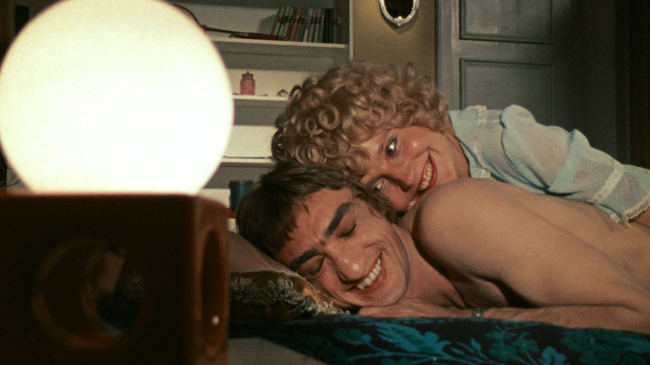A Rare Fassbinder Melodrama Makes Its Theatrical Premiere

Rainer Werner Fassbinder’s career lasted just sixteen years, but the staggering scale of his output—forty-four films in all, from shorts to theatrical features to television movies—means that, even decades after his untimely death in 1982, his body of work can still yield fresh surprises. Starting today, an important missing piece of the director’s filmography finally snaps into place, as Fassbinder’s previously unavailable family epic Eight Hours Don’t Make a Day (1972–73)—his first work for the medium of TV as well as one of his earliest experiments with the form of melodrama—begins its first-ever U.S. theatrical run, at New York’s Film Forum. Over the course of the next two weeks, the newly restored five-part serial will show there in three separate installments, before going on to play engagements across the country.
Starring such Fassbinder regulars as Gottfried John and Hanna Schygulla, the warmhearted Eight Hours revolves around the lives of the Cologne toolmaker Jochen (John) and those closest to him, chief among them his new girlfriend (Schygulla), his tight-knit family, and his self-organizing coworkers. The drama might have drawn a mostly negative critical reaction upon its nonetheless highly rated initial airing on German public television, largely on account of its unabashedly optimistic tone. But this week the critics have been quick to hail the working-class saga as a significant cinematic event.
- “For sheer joy per minute of film, there’s nothing playing now that comes close,” writes Ben Kenigsberg in a rave review for the New York Times, where the film is a “Critic’s Pick.” Kenigsberg declares Eight Hours to be a “masterpiece,” finding that, “in the generosity of its scope and the sophistication of its staging . . . [it] makes Mr. Fassbinder look more inventive than just about any filmmaker working today.”
- In one of his “most unusual and self-revealing projects . . . Fassbinder looks closely at what family life is made of: the intertwined strands of work and love,” notes Richard Brody in the New Yorker. In doing so, the great filmmaker “offers a vision of practical possibilities for local change at work, in the community, and at home.”
- For Artforum, Amy Taubin highlights Eight Hours’ lively sprawl as well as its formal audaciousness. “Its elliptical narrative, multidimensional characters, and mise-en-scène that combined blocking and camera movement to depict shifting power dynamics would not have surprised viewers of Fassbinder’s theatrical movies, but they were out of line with the conventions of TV,” she writes.
- “The eight hours of Eight Hours Don’t Make a Day don’t make a day,” observes Melissa Anderson for 4Columns. “They instead untether us, as all great art does, from any linear sense of time. They are a portal to another side of a pessimistic genius—and to another idea of what our wrecked labor practices could have been, and maybe still could be.”
- Writing for the Village Voice, Max Nelson also sees the drama as an intriguing tonal departure for Fassbinder. In Eight Hours, which in its new restoration registers as nothing less than “a shock,” the director “gave the characters . . . all the freedom, satisfaction, and powers of self-determination he would, in his other movies, carefully withhold.”
- Eight Hours finds the legendary filmmaker at the very top of his game, according to Slant’s Chuck Bowen. With the sprawling drama, “Fassbinder blends kitchen-sink realism with the feverish expressionism that would cement his legend, finding the best of both worlds: relatable, fastidiously detailed fantasy.”
- And, finally, take a look at our trailer for the film below:



